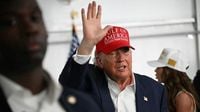On September 4, 2025, the White House became the epicenter of America’s growing focus on artificial intelligence, as First Lady Melania Trump and President Donald Trump hosted a pair of high-profile events that signaled just how seriously the administration is taking the AI revolution. The day began with Melania Trump’s rare public remarks at a White House event on AI education, and concluded with a star-studded dinner that brought together some of the world’s most influential tech leaders—including Mark Zuckerberg, Tim Cook, Bill Gates, and Sam Altman.
During the morning’s event, Melania Trump set the tone by describing the current era of artificial intelligence as a “moment of wonder.” Addressing the White House Task Force on Artificial Intelligence Education, she emphasized America’s responsibility to prepare its children for a future powered by AI. “It is our responsibility to prepare children in America,” she declared, highlighting how self-driving cars, surgical robots, and military drones are all “powered by AI.” According to The Lion, she added, “The robots are here. Our future is no longer science fiction.”
The First Lady’s comments underscored the sense of urgency and opportunity surrounding AI innovation. She predicted that artificial intelligence would become “the single largest growth category in our nation” during President Trump’s administration, and even suggested that AI might “become known as the greatest engine of progress in America’s history.” Yet, Melania Trump also cautioned against unchecked advancement, warning, “During this primitive stage, it is our duty to treat AI as we would our own children – empowering, but with watchful guidance.”
Thursday’s event marked the second meeting of the White House Task Force on Artificial Intelligence Education since President Trump signed an executive order in April 2025 designed to advance AI education among American youth. The order established a national policy to “promote AI literacy and proficiency among Americans,” with goals that include integrating AI into K-12 education, providing training for teachers, and developing an “AI-ready workforce.”
Melania Trump has emerged as a prominent advocate for AI education, having recently narrated her own audiobook using artificial intelligence and launching a national Presidential AI Challenge in August. The challenge invites students and teachers to “unleash their imagination and showcase the spirit of American innovation” by submitting projects that use AI to address community challenges. “The Presidential AI Challenge is the first major step to galvanize America’s parents, educators and students with this mission,” she said, reiterating her call for Americans to “lead in shaping a new magnificent world” in the AI era.
The event drew a notable lineup of Cabinet Secretaries and private sector leaders. Education Secretary Linda McMahon announced a significant policy shift, stating, “In supporting our current grantees, we’ve issued a Dear Colleague letter telling anyone who has received an ED grant that AI tools and technologies are allowable use of federal education funds.” She explained that this move would empower states and schools to explore AI integration in ways that best fit their communities. McMahon also lightened the mood by joking that Barron Trump, the Trumps’ college-aged son, was “helping you with a little bit of this as well,” earning laughs from the audience.
Agriculture Secretary Brooke Rollins addressed the digital divide that often leaves rural Americans behind. “We cannot let that happen with AI,” she said, stressing the importance of inclusive technological progress. Rollins further asserted, “President Trump has been very clear, the United States will lead the world in artificial intelligence, period, full stop. Not China, not our other foreign adversaries, but America.”
The day’s emphasis on American leadership in AI innovation carried over into the evening, when President Trump hosted a dinner at the White House attended by some of the tech world’s most powerful figures. According to Reuters, the guest list included Meta CEO Mark Zuckerberg, Apple CEO Tim Cook, Microsoft co-founder Bill Gates, and OpenAI CEO Sam Altman, as well as leaders from Google-parent Alphabet. Notably absent was Tesla and SpaceX chief Elon Musk, who sent a representative after posting on X that he could not attend.
Mark Zuckerberg, seated at President Trump’s right, called the gathering “quite a group to get together.” He highlighted the massive investments tech companies are making in U.S. data centers and infrastructure to “power the next wave of innovation.” Apple’s Tim Cook expressed gratitude to President Trump for “setting the tone” that has encouraged major investments in American manufacturing. OpenAI’s Sam Altman offered particularly direct praise, saying, “Thank you for being such a pro-business, pro-innovation president. It’s a refreshing change.”
While most tech leaders echoed the administration’s enthusiasm for AI growth, Bill Gates struck a slightly different note, urging that artificial intelligence should also be used to promote international development. “It’s great we all get together and talk about how the United States could lead in this key area and apply it even to the poorest outside the US, as well as to our great citizens,” Gates said, according to Reuters. Gates referenced Operation Warp Speed, the pandemic-era vaccine initiative, but pointedly noted that since taking office in January, President Trump has cut international aid and ended investments in the kinds of vaccines deployed during the Covid-19 pandemic.
The dinner also reflected a notable shift in Silicon Valley’s relationship with the Trump administration. Many tech leaders who had distanced themselves during Trump’s first term have since changed course, now promising heavy investment in the United States and aligning with some of the administration’s policies. According to AFP, some companies have even followed Trump’s lead in ending diversity promotion programs and initiatives to combat online misinformation.
President Trump’s recent threats of trade sanctions against countries that regulate U.S. tech companies—particularly the European Union—have further underscored his administration’s pro-business and pro-innovation stance. The message from both the day’s events was clear: the White House sees American leadership in artificial intelligence as both a strategic imperative and a source of national pride.
From Melania Trump’s call for responsible stewardship to the tech executives’ pledges of investment, September 4, 2025, marked a turning point in the nation’s approach to AI. The administration’s efforts to integrate AI into education, empower rural communities, and foster public-private collaboration suggest that the race for global leadership in artificial intelligence is well and truly underway—and America intends to set the pace.




